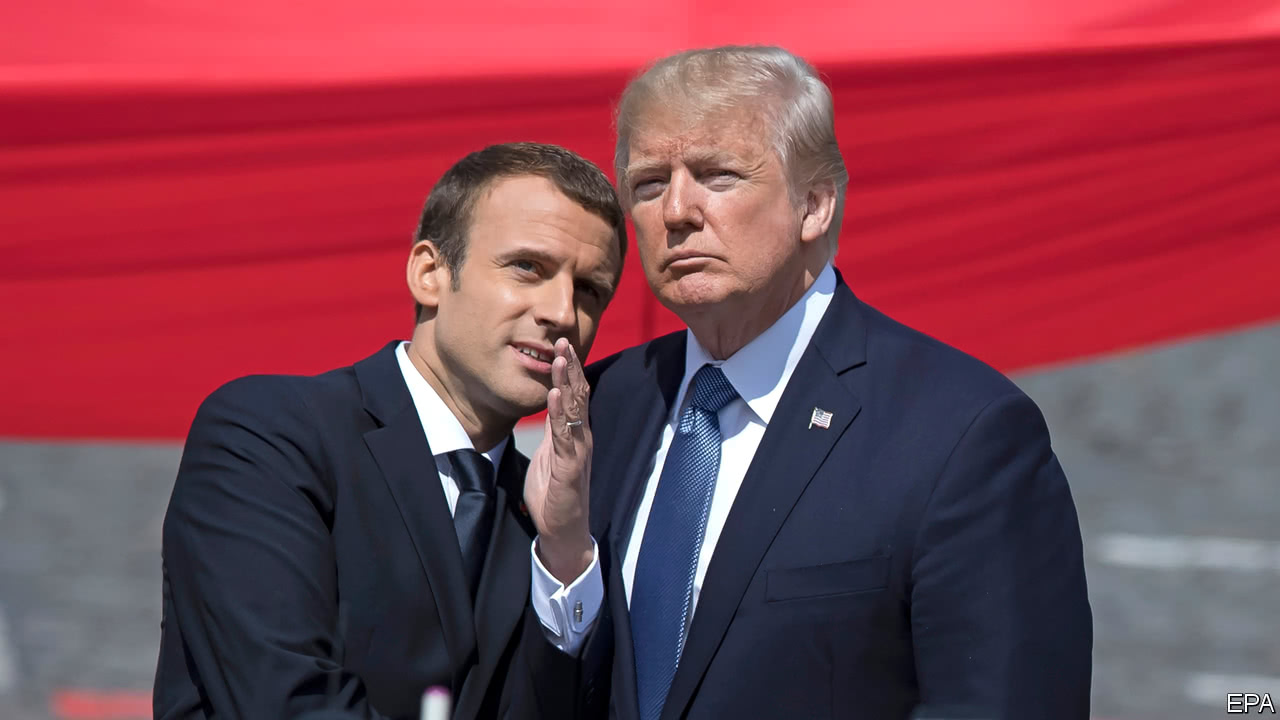
DONALD TRUMP sits down on April 23rd for dinner with his French counterpart, Emmanuel Macron, at the 18th-century mansion at Mount Vernon once owned by George Washington. It is hard to imagine two Western leaders with more contrasting world views. The host, a brash former reality-television host, was elected on a promise to shut borders and spurn multilateralism. The guest, an erudite philosophy graduate, won power by rejecting nationalism and praising Europe and the liberal world order. Yet, against the odds, Mr Macron is the European leader who has done the most to strike up an improbably warm relationship with Mr Trump. Some call him the “Trump whisperer”. But what can Mr Macron really hope to gain from this charm offensive?
Mr Macron does not seek to align himself unconditionally with the American president, although France took part in, and indeed pushed for, recent air strikes with America and Britain against Syrian chemical-weapons stocks. Nor is he after some sort of affectionate relationship, although he seems genuinely to have found a way to relate to Mr Trump, another one-time political outsider. Rather, the French president’s ambition is, at best, to encourage the American leader to use his influence in a more benign way and, at least, to keep him from inflicting real damage. This is why the most pressing matter during the three-day state visit will be to persuade Mr Trump not to walk away from the Iran nuclear agreement on May 12th, as he has threatened to do. Mr Macron will also seek to convince Mr Trump to remain engaged in Syria, both militarily and diplomatically. Other prickly matters under discussion will include trans-Atlantic trade and tariffs, Russia and climate change.
The French seem unusually happy to let Mr Macron make a go of this relationship. They tolerated the way he treated Mr Trump to a grand visit to France last year, complete with a Bastille Day military parade, of the sort that would have been unthinkable for, say, Britain’s Theresa May. But at some point there will be domestic pressure on the French leader to show something in return for all this flattery. Mr Macron has on occasion exaggerated his influence over Mr Trump. But he also knows full well that their differences are great and, at times, insurmountable. The French leader has notably got nowhere in persuading Mr Trump to return to the Paris climate agreement. “Sometimes I manage to convince him, and sometimes I fail,” Mr Macron said earlier this year. In reality, the best the French president may be able to hope for is to tame Mr Trump’s wilder instincts, and keep him at least listening to those inside the Western liberal-democratic club.
A year after his surprise election, and with a robust majority in parliament, Mr Macron still has political capital to spend. His domestic economic policies may not be popular at home, where unions are leading strikes and students holding sit-ins. But a majority of the French like the way he has changed the country’s image abroad. Mr Macron’s talk of grandeur and prestige goes down well, and the prospect of France acting as America’s preferred European interlocutor makes up for reservations the French have about Mr Trump. For now, Mr Macron may look like the smartest European handler of the tricky American president. In the longer run, though, if he cannot secure tangible return for his efforts, he will run the risk of looking naive, or foolish, or both.






























